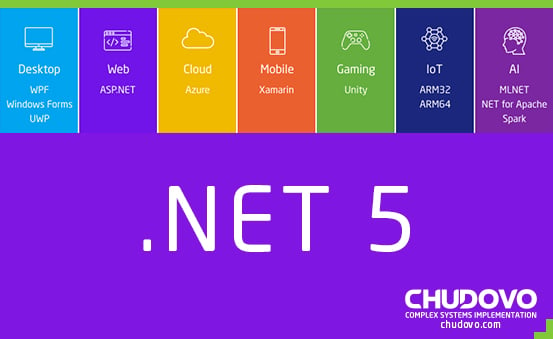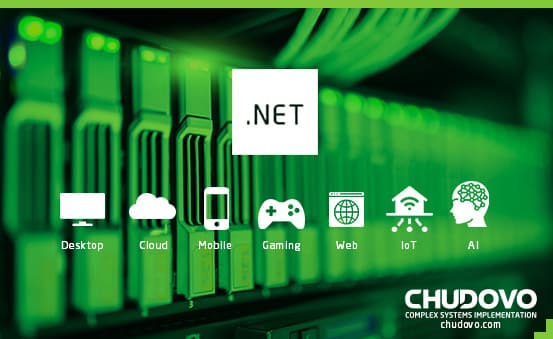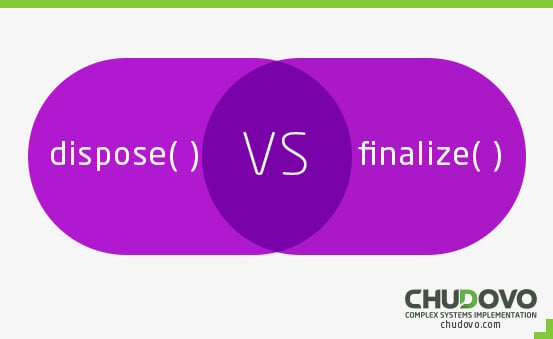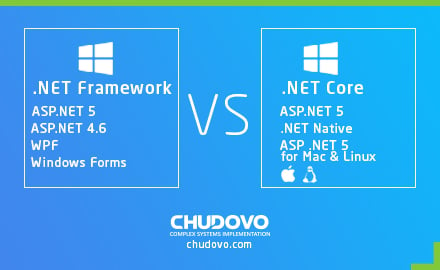Difference Between .NET Core and .NET Framework
Table of contents
.NET has been one of the most popular software development frameworks for several years now. While the framework touted by Microsoft has withstood the test of time, one must appreciate the evolution of .NET as a development framework, and the range of .NET benefits offered by it. In fact, the constant changes and additions to its features have only enhanced its utility over the years.
However, thanks to the agile nature of the software development industry and the tools frameworks that it uses, there exist a lot of apprehensions and confusions in the minds of both the developers and the clients. The primary areas of concern are – what .NET Core versions to use where, what are the .NET benefits of each version, and the approach to follow.
In this article, we talk about .NET Framework vs .NET Core implementation and do an in-depth analysis of the pros, cons, .NET benefits, disadvantages, and uses of both. We tell you what the future holds for .NET, and based on that what approach you should adopt for the development of different kinds of applications. So without much adieu, let’s get straight to the business!
.NET Core vs .NET Framework
The .NET core vs .NET Framework debate has been going on for a while now. .NET Core and .NET Framework are two different framework implementations from Microsoft, with one having evolved from the other. Wondering what is .NET used for? Though both the platforms are used for building server-side applications, there are subtle, yet significant differences between the two. In fact, both .NET Core and .NET Framework have several functional components in common, and you can even share your code across the two platforms.
At the outset, you must be wondering – What is .NET Core, what is .NET Framework, and why do we have two different platforms at all? Even if we have two platforms, do we need to prioritize one framework over the other, and how? Why are we even pitching .NET Core vs .NET Framework? Well, the answer to all these questions lies in understanding the fundamental differences between the nature and purpose of the two platforms, and the intricacies of their functional components.
Confused, huh? Well, let us break down the .NET Core vs .NET Framework debate for you!
What is .NET Framework? Traditionally, developers have been using the .NET framework to create both Windows .NET desktop applications and server-based applications. And what is .NET Core? .NET Core, on the other hand, is used to create server applications that run on Windows, Linux, and Mac. As of date, it does not support creating desktop applications with a user interface.
Interestingly, .NET Core is primarily an open-source framework that comes with multi-platform support. Currently, it focuses on the development of web applications using ASP, .NET, MVC, API. In recent times, Microsoft has been focussing heavily on the development and expansion of .NET Core and has touted it as the future of web-based application development.
It is important to note here that both the terms ‘platform and ‘framework’ can be used to refer to .NET Core and .NET Framework, as they perform both the roles. During runtime and compilation, they act as a platform, while the code library provides for the development framework.
.NET Framework Advantages
What does Net Framework do? While .NET Core is the future of application development, and it is all set to supersede .NET framework in the times to come, the hangover of years of the traditional use of .NET Framework is not going to die down that easily! When we talk about .NET Framework vs .NET Core in the present-day context, .NET Framework still does have some practical benefits of .NET. Let us tell you what .NET Framework does when used at the right place even today.
Time-Saving
Experienced application developers who have been in the industry for some time, have developed an ease with .NET Framework. They know what is .NET Framework and what does .NET Framework do. Writing code and developing applications using the framework come naturally to all .NET developers. .NET Core, at the same time, has a considerable learning curve, and it will take quite a few years before the .NET developers imbibe the same ease with the new open-source framework.
So, if you do not have much time to spare and are looking to get an application developed quickly, the .NET framework can prove to be a more viable and beneficial option for you.
For Existing App Maintenance
Since the .NET framework has been in use for years altogether, a majority of existing .NET applications have been built using this framework only. So if you are looking for Maintenance and up-gradation of your existing apps, then going with .NET Framework can be a good option. Notwithstanding the immense .NET benefits of migrating to .NET Core, it does require some time and effort.
Stability
Call it a blessing in disguise, but .NET Framework is what it is today, and it is going to remain so. Microsoft has announced that the current version of the Microsoft .NET Framework (version 4.8) is going to be the last version, and there will be no major .NET Framework update after this. Newer versions of the .NET Framework are not being planned either.
Therefore, if you need a stable application with no major add ons or advancements expected in the future, you can very well go with the existing .NET Framework. This is one of the .NET benefits that come with the use of the .NET framework.
.NET Core Advantages
Talking about .NET Core vs .NET Framework, .NET Core is an open-source and multi-platform implementation of the .NET has many advantages over the original Microsoft .NET Framework. In fact, that is the reason why .NET Core is being rolled out aggressively by Microsoft. We have listed down some of the key .NET benefits of migrating to .NET Core, below.
The Open-Source Edge
What is the first thing that comes to mind when we talk about what is .NET Core? ‘Open Source Framework’ – right?! Well, the mere open-source nature of .NET Core makes it a very dynamic and agile framework to work with. It is constantly improving and becoming better and better with open contributions. In fact, with open source, .NET programming has become so much more fun for the .NET developers, than what it was before. With constant improvement, there’s no limit to what can be done with the help of .NET Core, which also reflects the quality and utility of your applications. Isn’t it all that you want?!
Cross-Platform Compatibility
One of the best things about .NET Core is that it provides unparalleled support for the cross-platform needs of developers and applications. The apps developed using .NET Core are supported across all the popular platforms like Windows, Linux, and macOS. This is something that was not found in the Microsoft .NET framework earlier and can prove to be of great utility as most applications are developed for multiple platforms these days.
Unmatched Flexibility
The latest .NET Core versions bring together a lot of cool and useful features. In fact, Microsoft is doing amazingly well with all the new .NET Core versions that it releases. For example, with the .NET Core 3.0 version, .NET now supports WPF as well as Windows Forms. Going a step further, .NET Core 3.0 also supports cross-development between UWP, WPF, and Windows Forms. Now imagine the level of flexibility that the coder has, with all these options by his side, and what he can make of these! It’s a win-win-win for all stakeholders.
.NET Core Benefits
Microsoft’s own open-source code editor – Visual Studio Code is quite popular and easy to use. The best part is that with .NET Core, the code editor is also supported on Windows, Linux, and macOS, for .NET programming. VS Code has in-build modern features like IntelliSense and debugging, which make it a breeze to write code for .NET programming. Furthermore, .NET Core is absolutely compatible with all popular third-party code editors like Sublime Text, Emacs, and VI.
Other Functionalities
.NET Core has a string of many other benefits of .NET, features, and functionalities the importance of which may not be fully understood by someone from a non-technical background. Nevertheless, we will list a few of them.
.NET Core supports microservices architecture, which is a great thing. This allows cross-platform services like the ones developed with Java, Ruby, and Microsoft .NET Framework itself, to work seamlessly with applications developed using .NET Core. Further, the modular nature of .NET Core makes the deployment of containers in .NET programming much more convenient. With .NET Core, containers can be deployed on any platform, cloud, Linux, and Windows. .NET Core is also compatible with cutting-edge services like Docker and Azure Kubernetes Service, taking .NET programming to the next level.
Performance and Scalability
Performance and scalability are at the core of .NET Core! In fact, the modern framework has been designed keeping these two aspects in mind. In .NET Framework vs .NET Core, if you are looking to develop applications that are high performance and should be scalable, then there is no better option than .NET Core. Compare it with any benchmark, and you will found that .NET is at the top when it comes to performance. And guess what? When high performance meets modern application development features, the results are incredible applications!
What is the difference between .NET Core and .NET Framework?
So all said and done, what is the difference between .NET Core and .NET Framework, finally? Well, it is evident that .NET Core is much advanced, feature-rich, and flexible as compared to .NET Framework. It enables the .NET developer to build stunning applications, with minimal inhibitions. Best Part? .NET Core is the framework of the future, and it is going to grow and become better and better in the years to come. .NET Framework, on the other hand, has outlived its relevance and is bound to die down soon. In fact, in the light of .NET Core, one wonders what does .NET Framework do actually?
This is the primary difference between .NET Core and .NET Framework, and the choice is yours to make! If you are still wondering when to go with .NET Core and when with .NET Framework? Then read on…
Developers Should Use .NET Core When…
If you are going to get a new app developed, have some time to spare, and have the choice to choose between .NET Framework and .NET Core, then you must always go with .NET Core. Some other requirements the presence of which make a strong case for the use of .NET Core are,
- .NET Core can be launched on Windows, Linux, and Mac operating systems
- You want to make an application that is better than your competitors and offers your customers something ‘extra’
- You are okay with the idea of making, breaking, and fixing your applications for the better
- For the sheer love for open source .NET programming!
If you are able to relate to any of the above-mentioned conditions, then we highly recommend that you should go for .NET Core to develop your next software application.
Developers Should Use .NET Framework When…
As we mentioned, the .NET framework will continue to find uses in certain areas, at least for the next few years. You can choose to go with .NET Framework for application development, when,
- .NET Framework can be launched only on Windows
- There is a paucity of time and you want the application ready as soon as possible
- Want a stable app with no need for advanced features or future requirements of scaling up, and no .NET Framework update
- You want the ease of managing and running the app on a day to day basis
- You are working on an existing app and building upon it
- You do not have a team of expert .NET Core developers at your respite
You can go with .NET Framework instead of .NET Core if your requirements are limited by the above conditions. However, you must be well aware of what does .NET framework do, what it does not, what you’re losing, and what you are gaining!
What is the Future of .NET?
The future of .NET? Well, the future is going to be entirely inclined towards .NET Core. In the debate of .NET Framework vs .NET Core, .NET Core wins hands down!
With constant improvement and the support of Microsoft, it looks like .NET Core will take over the entire space in the near future. The process of integration has already begun. The earlier you adapt to it, the better placed you will find yourself in the competitive market!
The Takeaway
.NET Framework, with its multiple versions, has been a great asset to the IT sector for a long period of time. However, with its new avatar in the form of .NET Core, it has got a new lease on life. In fact, it has completely transformed what is .NET used for, these days.
Notwithstanding the utility of the traditional .NET Framework in certain respects, one simply can’t ignore the immense possibilities that are open by .NET Core. Its advanced features, open-source nature, multi-platform support, and flexibility take the entire game of app development to a whole new level. And you never know, how much it is going to evolve and what new possibilities might emerge in the coming years (while a full stop has already been put to the prospects of .NET Framework update).
Therefore, as a prospective .NET developer or a client, you must weigh in what is .NET used for, the pros and cons of both .NET Framework and .NET Core, and choose the one which best suits your business requirements. We wish you success!






